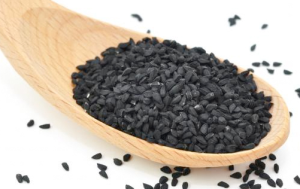
Contents
Uses
- Black seed is a plant. People have used the seed to make medicine for over 2000 years. It was even discovered in the tomb of King Tut.
- Historically, black seed has been used for headache, toothache, nasal congestion, and intestinal worms. It has also been used for “pink eye” (conjunctivitis), pockets of infection (abscesses), and parasites.
- Today, black seed is used for treating digestive tract conditions including gas, colic,diarrhea, dysentery, constipation, and hemorrhoids. It is also used for respiratory conditions including asthma, allergies, cough, bronchitis, emphysema, flu, swine flu, and congestion.
- Other uses include lowering blood pressure, lowering cholesterol levels, treating cancer, and boosting the immune system. You may read that a patent has been issued to cover the use of black seed to improve immunity, but don’t be misled. The presence of a patent doesn’t mean black seed has been shown to be effective for this use.
- Women use black seed for birth control, to start menstruation, and to increase milk flow.
- Black seed is sometimes used in combination with cysteine, vitamin E, and saffron to ease the side effects of a chemotherapy drug called cisplatin.
- Some people apply black seed directly to the skin for joint pain (rheumatism),headache, and certain skin conditions.
- In foods, black seed is used as a flavoring or spice.
Benefits
- Asthma & Allergies – Multiple studies have found that black seed oil has anti-asthmatic effects and depending on the cause of asthma, it was sometimes more effective than conventional treatment. The same properties make it beneficial for relieving allergies for many people.
- Eczema and Psoriasis – Black seed oil is also used for skin problems like eczema and psoriasis. It helps sooth inflammation and improve the speed and which skin heals.
- Digestion – Nigella Sativa seeds are carminative, meaning they aid in digestion and may decrease gas, bloating and stomach pain. Black seed oil is often sometimes used in remedies for intestinal parasites.
- Candida and Fungus – Black seed oil was also shown to be helpful in battling candida and fungal infections in the digestive system and on the skin.
- Cancers – Other studies have shown that a compound in black seeds and oil, Thymoquinone, helps induce apoptosis (cell death) in leukemia cells and other studies have shown this same effect in breast cancer cells, brain tumor cells, pancreatic cancer, cervical cancer, and even oral cancer cells and cavity forming bacteria. Black seed oil is also sometimes recommended as a natural protection against some of the danger from radiation and used in conjunction with conventional treatments.
- Heart Health – Thymoquinone in Nigella Sativa seeds has also been shown to have a protective effect on the heart, promote healthy cholesterol levels and help normalize blood pressure.
- Immune Health – Nigella Sativa (Black Cumin Seed) is unique it way of supporting the immune system. it contains antioxidants, beneficial acids and b-vitamins and supports the immune system, but acts different than herbs like elderberry or echinacea that require caution for those with autoimmune disease. Black seeds seem to balance the immune system- increasing immune function but not encouraging immune reactions against the body’s healthy tissue.
- Skin and Hair – It is also used topically in some cultures to naturally soften, strengthen and firm skin and help increase hair growth. Some studies even suggest that it may be a very useful remedy against scars and to prevent scar formation on wounds.
Cautions
- Black Cumin Seed Oil – There can be problems with any vegetable or seed oil, including black cumin seed oil if it isn’t extracted, processed or packaged correctly. It can easily go rancid if any of these factors are not correct and it is also important that the oil is stored in a dark, glass bottle (preferably miron glass).
Interactions
We currently have no information for black seed Interactions
Other Names
Ajenuz, Aranuel, Baraka, Black Cumin, Black Caraway, Charnuska, Cheveux de Vénus, Cominho Negro, Comino Negro, Cumin Noir, Fennel Flower, Fitch, Graine de Nigelle, Graine Noire, Kalajaji, Kalajira, Kalonji, La Grainer Noire, Love in a Mist, Mugrela, Nielle, Nigella sativa, Nigelle de Crête, Nigelle Cultivée, Nutmeg Flower, Poivrette, Roman-Coriander, Schwarzkummel, Small Fennel, Toute Épice, Upakuncika.
References
Source: WebMD, http://www.webmd.com/vitamins-supplements/
Source: National Center for Biotechnology Information
Source: Pharmacogn Mag.
Source: MDPI
